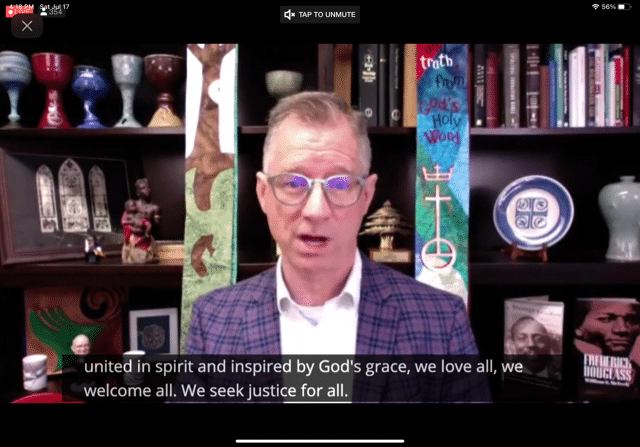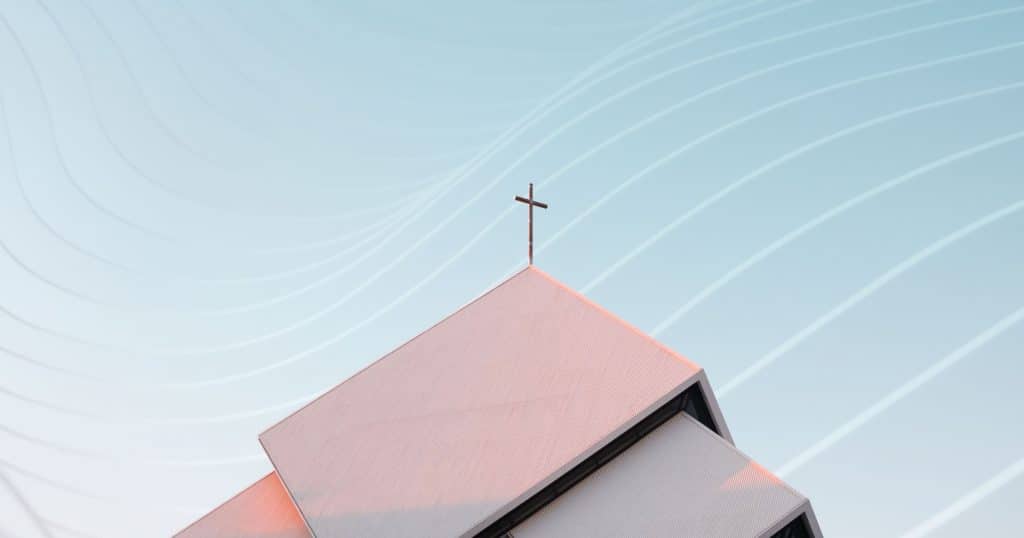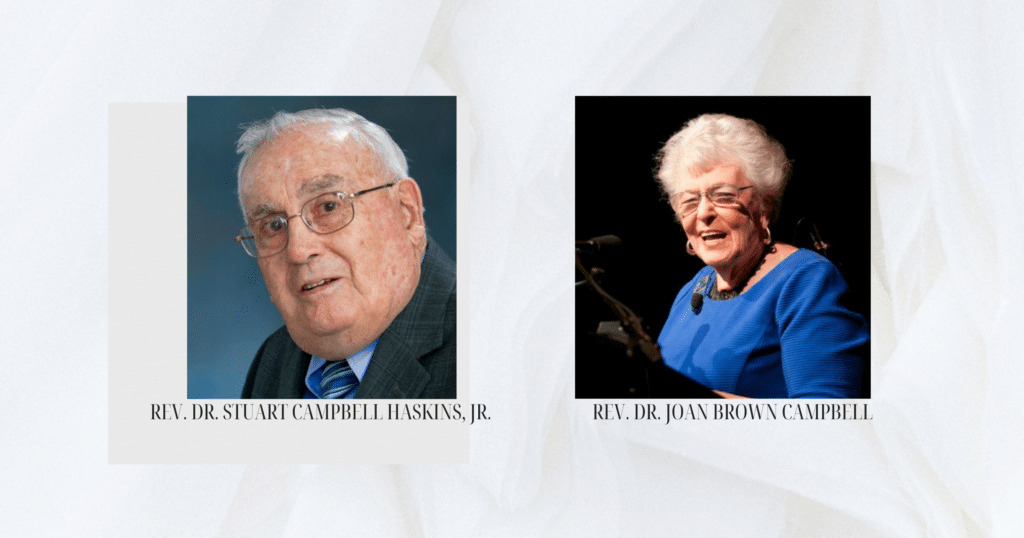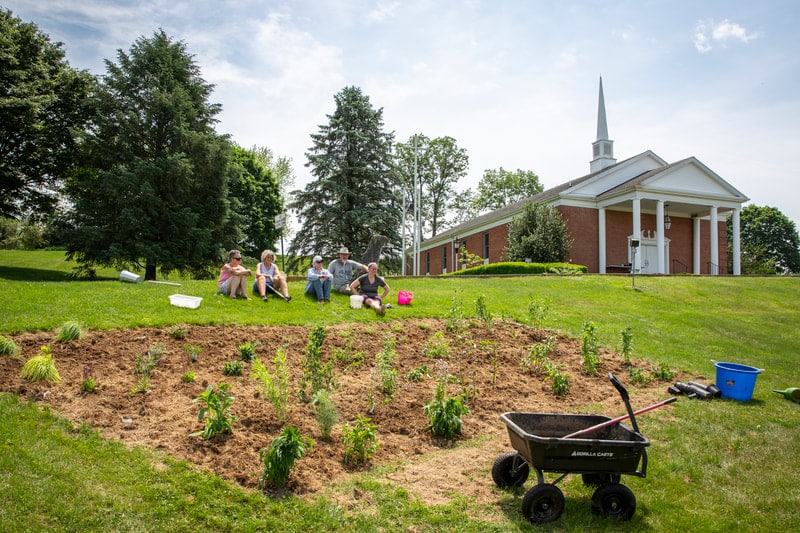John Dorhauer: We are a denomination on the move
“That they may all be one.”

The collective body of the United Church of Christ is living into Jesus’ prayer, taking on the twin pandemics of COVID-19 and racism and urgency of the crisis that is climate change.
General Minister and President John Dorhauer, in his State of the Church address to General Synod on Saturday, July 17, measured the denomination’s health and vitality by “our ongoing efforts to heed the call of the Holy Spirit and continue to display our courage in the struggle.”
He pointed to examples of unity, welcome, love and justice at every level of the church as the way clergy, congregants, Conference ministers, lay leaders and national staff have answered the call as “agents of transformation” in the mission to which they were called.
“Our narrative is not one of decline and diminishment, but of relevance to and in a world that is looking for a body fully committed to a love that seeks a just world for all,” Dorhauer said.
“When they tell the story of the UCC generations from now, it won’t be a story about our size but about our capacity as agents of transformation. They will tell the story of what our love in action did to help build a just world for all.”
Pandemic pivot
He cited the denomination’s responses to the global pandemic as his first example.
“Churches shut down overnight with no time to prepare,” he said. “Funeral services … suspended or altered in ways that never fully satisfied. Worship services conducted mostly virtually in a world where we all had to do it, but so few of us were prepared to do it right or well. We stopped singing and exchanging signs of peace – experiences virtual worship could not replicate.”
Dorhauer talked about burdens of grief and stress carried by all: local pastors who had to find a safe way to worship, chaplains who put their lives on the line to visit the sick and the dying, Conference ministers and staff who attended to the needs of their clergy, national setting employees who worked from home to enable the church to carry on its mission in the midst of COVID-19.
“And yet we aren’t just surviving this. Our mission is thriving in the midst of it. And it is thriving because of pastors and chaplains and caring lay leaders and Conference staff and national-setting employees who adapted because they had to and did whatever was necessary to ensure that the work of love and justice were not compromised even by a global pandemic.
“Reports came in that in many settings, new members were discovering our churches online. College students who went away to school in the fall kept worshiping weekly with their home church. More people were showing up in online services than were coming to the weekly in-person services. Contributions to support the life and mission of the local churches on the whole remained steady. The sacraments and the liturgical rituals of the church, from the Eucharist to ecclesiastical councils to installations and ordinations all found a new home in the virtual spaces we were forced to occupy.
“What started out as a ‘we will do this because we don’t have a choice’ approach became a ‘wow, look what the Holy Spirit can do!’ attitude,” he said.
“This church and the faith that sustains it have revealed themselves in the midst of a global pandemic that altered the landscape of our future.”
White racism
Turning to another pandemic, “the persistent and prevalent pandemic of white racism,” Dorhauer challenged the body to come together collectively to become anti-racist church.
“Is the United Church of Christ, a denomination rooted in white centeredness and still to this day a church that bears all the markings of a body invested in its whiteness, willing to find its courage in the struggle for peace and justice and become a fully anti-racist partner?
“There are signs that we are.”
As evidence, he cited the race audit of the national setting, initiated by the United Church of Christ Board and funded in part by the Council of Conference Ministers, “a signal to us all of their own personal investment in the process. Many of those Conferences have already begun the work of reaching out to the company conducting the audit to see if they can do the same thing.”
He pointed to the work of the curricula for Sacred Conversations to End Racism, with 140 facilitators trained nationwide to lead those conversations.
“Those facilitators will form a network of leaders who will also help us conduct a new denomination-wide mission effort launched at this Synod called Join the Movement [Toward Racial Justice] – an effort to begin to document in full what every covenant partner in this denomination is doing to end racism.
“The state of the church will be determined in part by our capacity and willingness to leverage whatever power and privilege we have to finally end the scourge of white centeredness in our country, our culture and our church,” Dorhauer said. “There is clear momentum here to do this; and once again we are showing a clear willingness to join the movement. Let’s all hope and pray this time we are in it to win it.”
Climate change
Turning to a justice issue that “will have more to say about the state of our church than any metric we would otherwise rely on,” he spoke about the crisis of climate change.
“In his book ‘Climate Church, Climate World,’ Jim Antal writes: ‘To resolve this emergency, God is calling the church to initiate a moral intervention,’” he said.
“Whether we do is another test of our relevance, health, and vitality. We are brokers of hope – God’s hope, Christ’s hope.
“Sweltering temperatures, melting ice-caps, rising oceans, raging hurricanes, out-of-control wildfires, teeming floods, searing droughts, disappearing coastlines, altered migratory patterns, and almost 70 million refugees swarming the globe in search of food, water and protection are among the apocalyptic-type catastrophes that have become commonplace. Waking up to an alarm that has been sounding for decades is our moral imperative.”
He cited a number of ways the UCC is already responding.
- “This year we were nominated for and a finalist for national recognition as a leader in climate justice.
- “We have authored landmark reports on the effects of climate justice on marginalized communities of color, bringing people’s attention to the impact of environmental racism.
- “We are partnering with the United Nations to lift up and fight for Sustainable Development Goals.
- “At this Synod, the Cornerstone Fund is announcing their Creation Care Fund – low-interest loans to churches who will find ways to lower their carbon footprint.
“We are committed to being the purveyors of a hope borne of our yes to God’s call to initiate a moral intervention. We can do this,” Dorhauer said. “That we are opening ourselves up to this is another indication of the state of our health and well-being.”
‘Clear signs’ of vitality, relevance
The general minister and president heralded national staffers and the Council of Conference Ministers for their work “at the intersection of love and justice.”
“At every setting of this church there are clear signs of health, vitality and relevance,” he said.
“Whether we have the willingness to sustain that will be answered not by our attendance in worship, not by dollars in our offering plates, but by our ongoing efforts to heed to call of the Holy Spirit and continue to display our courage in the struggle. If we apply the kind of endurance, adaptiveness, tenacity, don’t-quit-edness to the pandemics of racism and climate change that we just displayed in overcoming COVID – then I say the state of the church is as vital and healthy as it ever has been or ever could be.”
He spoke about the importance of partnerships – both within the denomination and with ecumenical and interfaith colleagues.
“Cultivating these relationships is both an honest response to Jesus’ prayer, ‘That they may all be one,’ and a source of wisdom needed to endure these challenging times.”
Work in progress
He referenced the remaining two years of his term by ticking off items in process:
- A potential office move from the Church House, downsizing to another downtown Cleveland building, “a move that will save hundreds of thousands of dollars a year … and preserve millions that would have to be spent” on a 120-year-old building.
- A nearly finished redesign of ucc.org, to provide “access and resources to tell the world who we are, what we care about and what our mission is.”
- A launch of an educational platform, Frontline Faith, to provide churches “with meaningful and relevant resource material.”
- A renewed partnership with the United Nations.
- Ongoing work on the Manual on Church and discussions about a new Book of Worship.
“We are a denomination on the move,” he said. “The missional impulse to love all, welcome all and seek justice for all is spot on.”
Dohauer closed by singling out four colleagues — Associate General Ministers Traci Blackmon and Karen Georgia Thompson, Chief Strategy Officer Cheryl Williams and outgoing UCCB Chair Yvette Wynn — for their wisdom and leadership. He offered thanks to all UCC clergy and Conference ministers, saying, “You all show up every day, in ways that matter. If there is any health, relevance or vitality to speak of today it is because of you.”
“There is much we have done that we can be proud of – but we have so much more to do to respond faithfully to our call to love in partnership with a still-speaking, still-moving God.”
Related News
Peace Be With You…
“…And also with you” is the response on Sunday mornings and on occasions where the peace...
Read MoreBreaking barriers and forging loving partnerships: Two servants of God are remembered
This Eastertide, the United Church of Christ remembers the Rev. Dr. Joan Brown Campbell and...
Read MoreGetting down and dirty in the soil: Rural congregation discovers ‘life has the last word’
The Rev. Julia L. Brown has a love/hate relationship with this time of year. “I dislike...
Read More



